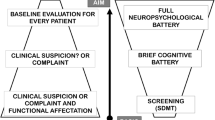Abstract
Cognitive decline in multiple sclerosis can appear early in the course of the disease and may not be evident to the clinician if not investigated formally. Clinical neuropsychological evaluation with these patients has main peculiarities: disabilities, fatigue, relapses, medical treatment, psychological problems, that have to be seriously taken into consideration in choosing the tests and interpreting the profile. The peculiarity of cognitive decline in MS suggests an examination primarily of attentive–executive and memory domains, with Pasat and Symbol Digit Modalities Test, strongly recommended, together with memory test. The utilization of extensive or brief cognitive batteries depends on the different goals of the neuropsychological evaluation. It is important to find a screening procedure to be used by neurologists to identify the patients to be sent to an early formal evaluation, in consideration of the interference of cognitive profile with fundamental aspects of individual functioning, included adherence to rehabilitation and pharmacological treatment.
Similar content being viewed by others
References
Rao SM, Leo GL, Bernardin L, Unverzagt F (1991) Cognitive dysfunction in multiple sclerosis: I. Frequency, patterns and predictions. Neurology 41:685–691
Rao SM, Leo GJ, Ellington MS, Nauertz T, Bernardin L, Unverzagt F (1991) Cognitive dysfunction in multiple sclerosis: II. Impact on employment and social functioning. Neurology 41:692–696
Benedict RHB, Munschauer F, Linn R, Miller C, Murphy E, Foley F et al (2003) Screening for multiple sclerosis cognitive impairment using a self-administered 15 item-questionnaire. Mult Scler 9:95–101
Amato MP, Ponziani G, Siracusa G, Sorbi S (2001) Cognitive dysfunction in early onset multiple sclerosis: a reappraisal after 10 years. Arch Neurol 58:1602–1606
Langdon DW, Thompson AJ (1999) Multiple sclerosis: a preliminary study of selected variables affecting rehabilitation outcome. Mult Scler 5:94–100
Patti F, Amato MP, Trojano M, Bastianello S, Tola MR, Goretti B, Caniatti L et al (2009) Cognitive impairment and its relation with disease measures in mildly disabled patients with relapsing–remitting multiple sclerosis: baseline results from the Cognitive Impairment in Multiple Sclerosis (COGIMUS) study. Mult Scler 15:779–788
Sartori E, Edan G (2006) Assessment of cognitive dysfunction in multiple sclerosis. J Neurol Sci 245:169–175
Engel C, Greim B, Zettl UK (2007) Diagnostics of cognitive dysfunctions in multiple sclerosis. J Neurol 254(Suppl 2):II-30–II-34
Foong J, Rozewicz L, Quaghebeur G, Thompson AJ, Miller DH, Ron MA (1998) Neuropsychological deficits in multiple sclerosis after acute relapse. J Neurol Neurosurg Psychiatry 64:529–532
Krupp LB, Elkins LE (2000) Fatigue and declines in cognitive functioning in multiple sclerosis. Neurology 55:934–939
Arnett PA, Higginson CI, Voss WD, Wright B, Bender W, Wurst JM (1999) Depression mood in multiple sclerosis: relationship to capacity-demanding memory and attentional functioning. Neuropsychology 13:434–446
Archibald CJ, Fisk JD (2000) Information processing efficiency in patients with multiple sclerosis. J Clin Exp Neuropsychol 22:518–528
Nocentini U, Di Vincenzo S (2007) La riabilitazione dei disturbi cognitivi nella sclerosi multipla. Springer, Italia
Lezak MD, Howieson DB, Loring DW (2004) Neuropsychological assessment, 4th edn. Oxford University Press, New York
Benedict RH, Fischer JS, Archibal CJ et al (2002) Minimal neuropsychological assessment of MS patients: a consensus approach. Clin Neuropsychol 16:381–397
Rao SM, Cognitive Function Study Group (1990) A manual for the Brief Repeatable Battery of neuropsychological test. National Multiple Sclerosis Society, New York
Beatty WW, Paul RH, Wilbanks SL, Hames KA, Blanco CR, Goodkin DE (1995) Identifying multiple sclerosis patients with mild or global cognitive impairment using the Screening Examination for Cognitive Impairment (SEFCI). Neurology 45:718–723
Solari A, Mancuso L, Motta A (2002) Comparison of two brief neuropsychological batteries in people with multiple sclerosis. Mult Scler 8:169–176
Randolph JJ, Arnett PA, Higginson CI (2001) Metamemory and tested cognitive functioning in multiple sclerosis. Clin Neuropsychol 15:357–368
Conflict of interest
The author declares that she has no conflict of interest related to the publication of this article.
Author information
Authors and Affiliations
Corresponding author
Rights and permissions
About this article
Cite this article
Possa, M.F. Neuropsychological measures in clinical practice. Neurol Sci 31 (Suppl 2), 219–222 (2010). https://doi.org/10.1007/s10072-010-0374-6
Published:
Issue Date:
DOI: https://doi.org/10.1007/s10072-010-0374-6




